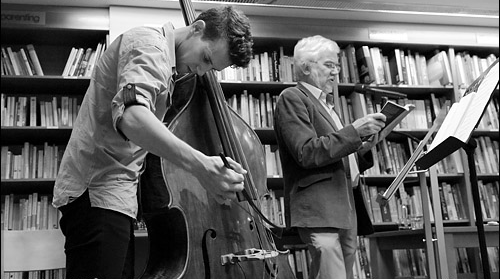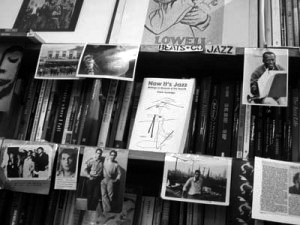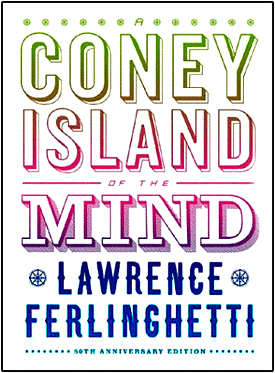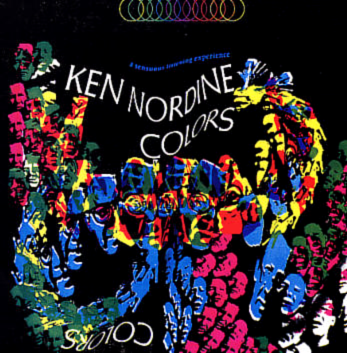
Geoff Page and bassist Alex Boneham at a jazz poetry reading in Canberra, February 2012. Photo by Brian Stewart. jazz.cyberhalides.com
'if you're in this higher condition and you're performing,
something transcends the music and reaches inside of
someone else... someone gets it, they leave and do
their thing. Then something comes out of their mouth
they didn't intend to say, or things start to happen to them'
- Wayne Shorter
'neither poets themselves nor their auditors are fully aware
of the excellence of poetry: for it acts in a divine and
unapprehended manner, beyond and above consciousness'
- Percy Bysshe Shelley
'Poets who will not study music are defective.' - Ezra Pound
There was once a period when I loathed literature.
Perhaps I am saying this just for effect, to hook you in? Perhaps I am misremembering? But no. I remember it well. It was in second year at university and looking back, I know now that I was responding to advanced learning in a way that thousands had done before me.
I didn’t take the same journey with poetry as I did with literature in university. It’s a different beast. Some of what I learned leaks over, but there are oceans of knowledge I have barely stuck my toe into when it comes to poetry. As for jazz – well, I took recorder lessons from when I was five, and learned the flute for a year when I was 12. None of it was jazz.
Now, still a writer and a reader of prose, I am also a listener to jazz and am falling in love with poetry – not only as a reader but a writer of it as well. I’ve arrived late to it. Although I have been dipping for years into the work of e.e. cummings, Hank Bukowski, Rumi, Dante and Chaucer, now a swag of other names are on my list. In the last ten years, jazz has permeated my life, so not surprisingly I’m often drawn to poems that share something with jazz and improvised music.
My experiences with literature in second year at university has me thinking: do I need to take that knowledge journey into jazz poetry, that journey into the dark woods of fragmentation and disassociation? Do I need to learn about music and poetry the way I learned about literature, with the risk that I’ll learn to hate them both before I start to love them again?
How did Allen Ginsberg write jazz poetry? Gregory Corso? All those other Beats? How do today’s jazz poets write their jazz poetry? Does Yusef Komunyakaa have musical training? What I know about the ones I know about is that they listened. That seems to be the unifying trait. Open ears.
Kevin Brophy – when judging a jazz poetry writing competition recently – said he felt the poems that worked best, of all submitted, ‘found a way to negotiate between their interest in music as subject matter, music as an experience and words as both rhythmic sounds and vehicles of meaning’.
This gets right to the crux of the matter. There’s room in that description for all kinds of relationships between music, listener, poet, reader and verse.

The Beats & Co and Jazz shelf at Kris Hemensley's Collected Works bookshop in Melbourne, Australia. Photo by the author.
For most people, jazz poetry is jazz as poetry. A poetry that doesn’t exactly mimic the sounds of jazz, but does incorporate rhythms, repetitions, syncopation and space so that its performance can evoke what jazz evokes. There’s also the poetry written about jazz. Occasionally both approaches appear in the same poem – descriptions of and allusions to famous jazz players riddle the canon. Vachel Lindsay didn’t enjoy the jazz music of his time, but he has become famous as one of the first poets to create what we would probably now call jazz poetry. He called it ‘singing poetry’ – declamatory, choosing words for their sounds as much as (sometimes more than) their meaning, amplifying sound with movement. I’d love to have seen and heard it.
Jazz musicians I’ve spoken to, heard or read will talk about their music using metaphors of language. Some poets talk about their work with metaphors of music. I’m not breaking new ground by saying that jazz and poetry can sit well together. They both have conventions that use frameworks for improvisation, and (in performance) the application of such elements as sound, silence, intensity and rhythm by a skilled perpetrator. You might assume that knowledge of music (jazz in particular) would be necessary for the writing of jazz poetry.
But what kind of knowledge are we talking about? Does a jazz poet require a technical knowledge of jazz? Or do they just need to be able to ‘feel it’?
Zen and the Art of Motorcycle Maintenance, that famous, never out of print, 1974 book by Robert M Pirsig is a philosophical treatise thinly disguised as a novel. In it, Pirsig proposes two ways to think about things; the Classical approach and the Romantic. His protagonist starts out Classical (rational, not interested in experiencing things just for what they make you feel) and comes to understand, along the book’s journey, that the Romantics have a point. It is acceptable just to feel; to emotionally respond. In fact, he discovers, sometimes it’s not just acceptable, but preferable. It depends on the type of experience you’re after.
Maybe you just need to be able to groove.
Ken Nordine – famous for Word Jazz – was interviewed in May 2010 and described working with musicians in his studio. ‘They’d say ‘What are we going to do?’ And I’d say,‘Well, get something going, get a groove going, and you’ll know and I’ll know when you know when it’s happened then I’ll jump on top of it and we’ll go from there’.’ (1’43”)
If performed musically, a poetry reading or recitation can evoke jazz, regardless of the content of the poem. In the same interview, Nordine talks about reciting TS Eliot poetry, sitting in with bassist Johnny Frigo and pianist Dick Marks. He had memorised many TS Eliot poems, and all of the Rubaiyat of Omar Khayyam. Equipped with these pieces, he was able to join in the musical conversation that Frigo and Marks were having. With the same audiences coming every night, he eventually ran out of memorised poetry and started making things up. Which is how, Nordine says, his famous jazz poem ‘Down the Drain’ came to be.
I have no formal training in music, but my extensive observation tells me that jazz and the improvising musicians who make it are in conversation when they perform together. Participants listen, contribute, build on others’ contributions, veer off into red herrings, come back again, and end the conversation in an agreed way. Occasionally there’s talking over each other, not listening and disengagement. That doesn’t work too well, in the way that it wouldn’t work if you were talking to someone that way in your day-to-day language. There’s a framework in jazz; it’s not musical babbling, no matter what improvised music may sound like the first time you hear it. Even so-called ‘free’ jazz is not random notes. Unless you’re trained in how to communicate in that language, unless you’re fluent in its conventions and timings, you’ll miss things these musicians say, the nuances of their back-and-forth.
But you don’t need to know it all to feel it all.
I’ve been carried away into bliss – and sorrow, and rage – more than once, letting music I don’t ‘understand’ wash over and through me.
Hearing musicians talk about music is comparable to hearing linguists talking about English. Both groups employ a meta-language –language about language. Just as this word or that has associations, weight, history, deep meaning, so do notes, chords, intervals. Listen, for example to this ABC RN documentary about the ‘Devil’s interval’ and realise that this idea of music as language extends into an equivalence between the choices a musician makes when composing or improvising. ‘To elicit effect X in your audience, employ device Y.’
There have been some experiments conducted about whether being musically trained affects the way you listen. The results of at least one experiment 1 performed by Dr Daniel J Levitin and colleagues (Levitin is the author of This is Your Brain on Music on Music) indicate that the differences are not as large as you might intuitively imagine. Trained musicians hear emotional cues in music more intensely – a variation in the speed or loudness of a piece of music might elicit the same emotional response in all listeners but the response is likely to be more intense for listeners who have significant musical training. Perhaps because they’ve been trained to hear the cues and recognise them. Like me and literature, a trained musician can’t switch off what they’ve learned.
There is no unequivocal answer to the question of whether any audience member (poets and others) should be musically trained to fully appreciate jazz or to be able to write or appreciate jazz poetry. Jazz critic Martin Williams (writing in the 1950s and 1960s) said that he wanted his readers to be able to ‘hear a numeric 4/4 pulse and count measures’2. Acknowledging, of course, that music criticism and poetry are not the same thing, there is an underlying assumption to this requirement of Williams’ that technical knowledge is essential for proper listening. An aligned assumption is that experiencing the music without technical knowledge is going to provide a lesser experience.

Some of Ferlinghetti's most famous poems from this collection such as 'I Am Waiting' and 'Junkman's Obbligato' were written for jazz accompaniment. 50th Anniversary Edition (with CD) by New Directions, 2008.
Jazz poetry experiences an occasional renaissance, such as the one it seems to be in right now. Old poems by Beats are rolled out for modern audiences (see this performance of Lawrence Ferlinghetti’s ‘I am Waiting’ from 2011) and they still have an attraction. Hip hop and other genres have launched off a jazz poetic sensibility and created something new(-ish).
Literature had been an escape and an inspiration for me since I could first read, but my response to it had always been emotional, from the heart. I had no technical understanding of how it ‘worked’ – how does a word or a paragraph evoke a complex, layered response of sadness, yearning, excitement, suspense or rage? When I watched a film, there might be a soundtrack, but here on the page, there were no violins to warn of impending romance, no fast paced car-chase music, light-hearted oboe or gutsy electric guitar. Something else was cueing my emotions, and I knew it was more than word choice.
I understood enough to know that Hemingway’s sentences and Steinbeck’s landscapes made their voices unique and compelling. But what I’d never done was to look closely at how this effect was achieved. While I was learning to take writing apart, I was grieving for my innocence, angry at my lecturers and tutors; cross at an entire learning system that could destroy my pure enjoyment of prose by forcing me think about how the writer achieved whatever emotional responses their work elicited in me. The only reason I stuck with the process was that I knew I had no way of un-learning, or un-knowing the small amounts I had mastered so far. The only way forward was forward.
Inevitably, persevering as I did, the pieces came back together again and I was left with a more sophisticated understanding of literature. I’ll never be able to return to those innocent days of bathing, uninformed, in what a book provides when I open it up and plunge in. Now, when I read a book that’s wonderful, I’m better able to tell you why. And when it misses the mark, I have a better understanding of how it does so and what can be done to change it. This has its own frustrations of course. Mainly ‘why didn’t the author [insert suggestion for improvement here]?’ and the closely related, ongoing anxiety that I’ll miss something obvious in my own work, blinded – as one often is – by the mechanics of this or that word choice, sentence or description and unable to discern the flaws in the overall contrivance. But the point is that it all came together eventually. I can switch the analysis off, or at least turn the volume down low enough to be able to enjoy a piece of prose for what it is, without analysing how it is having this effect or that. Eventually, I came out the other side of the fragmentation that advanced learning brought, armed with a new way of reading – and writing.
I sit here, looking at this jazz poetry motorcycle, and wonder if I should be pulling it apart so I can agonizingly learn how to reassemble it. Or should I hop onto it and ride off for the time of my life into a horizon where jazz and poetry meet.










